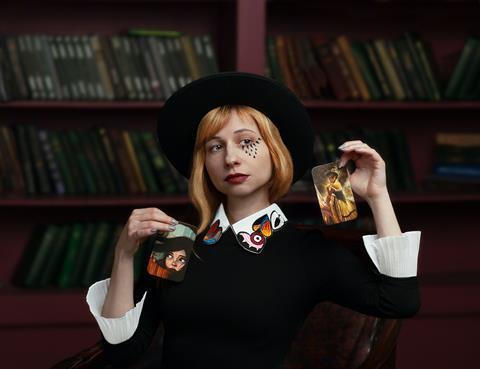With the news that you can now study 'Magic and Occult' at Exeter University, writer Belle Tindall muses on the positives and negatives for believers of Jesus.

In 2024, Exeter University will to offer a Masters degree in "Magic and Occult Studies". That’s right, a little slice of Hogwarts right there in the West Country. That’s a joke. Obviously. And a pretty unfair one too, considering this university course is built on modules like decolonisation, feminism, palaeography, archaeological theory, medieval history and folklore. So, rest assured, it’s not all Quidditch and ‘wingardium leviosa’ (although if you don’t know what those words mean, this course probably isn’t for you). It’s a mighty looking Masters.
What’s really interesting is what Professor Emile Salove, who is heading up the MA, has said to the mainstream press who all seem to be a little dumbfounded that such a course would be thought up: "A recent surge in interest in magic and the occult inside and outside academia lies at the heart of the most urgent questions of our society… a superficial glance at our own beliefs and the beliefs of the people around shows us magic is a part of our everyday life. Responsible scholars would do well to take this seriously."
We would do well to take this MA completely seriously (the odd cheap Harry Potter joke permitted though, right?)
I think she’s dead right. We would do well to take this MA completely seriously (the odd cheap Harry Potter joke permitted though, right?). And I think we should do so from two angles. Firstly, allow me a moment to offer up my more predictable Christian take. I hate to sound alarmist, but I just happen to believe that the unseen realms are as real and as powerful as the seen ones. It’s a by-product of believing in a God that I can’t see, I suppose. All that we see is not all that there is, I’ve built my life upon that notion. And so, it would be weird of me to not be the teeniest tiniest bit cautious when it comes to magic thats source is not the God that I know. When it comes to all things supernatural, I think that the majority of it is real, and that’s what’s scary about it. We have no idea what we’re dealing with. You could argue that we never have. Not really.
We can, and we certainly have, taken this caution way too far. My heart-felt solidarity goes out to all those who weren’t allowed to watch Buffy the Vampire Slayer after school. I’m still bitter. But still - this stuff is real, so it matters. That’s my first not-at-all-hot take. Here’s my second (hopefully slightly hotter) one: this MA gives us a read on culture, and we should be really excited about it.
Read more on the occult
I experienced ‘post-book grief’ after reading books on the occult but it led me back to the Bible
I was a cocaine-snorting model and singer who loved the occult until God gave me a Christmas miracle
We’ve been living under a myth for a little while now, and that myth is dis-enchantment. It’s the idea (originally predicted by sociologist Max Weber in 1918) that we’ve moved beyond needing the mystical side of life. We’re disinterested in anything magical and unimpressed by anything supernatural, not to mention far too sophisticated for anything that transcends our reason or logic. We’re enlightened now, we know all that there is to know, and understand all that’s worth understanding. Intellectually, we’ve made it. So, naturally, we don’t need anything as juvenile as magic. Hence, we’re dis-enchanted. Or, at least, we’ve told ourselves that we are. We kidded ourselves into thinking that we’d arrived at disenchantment a few decades ago, but we hadn’t, we’ve just been pretending.
I know that dis-enchantment is a myth, because I just happen to host a podcast called Re-Enchanting. And the more I’ve got to speak to people about how we can "re-enchant" parts of culture, the more I’ve been told that our craving for enchantment never really went away. It’s been there, hidden in plain sight all along. We may have ditched folklore, but we created Disney. We may take issue with organised religion, but we’re obsessed with spirituality.
One of our very first (and my very favourite) podcast guests, was the author Francis Spufford, who put it way better than I ever could. He said: "We are meaning-making creatures. We can’t stop making enchantments." Franics is right. Disenchantment is a façade, and this MA is proof. I suppose you’re waiting to for me to get to the part where I explain why this is good news for Christians?
I did my degree in biblical studies; a book where donkeys talk, virgins have babies, oh, and the Son of God rises from the dead. You want magic? I can give you magic.
Well, it’s because we know a little something about the un-graspable. Don’t we? We know that the craving we humans have for these things was/is/always will be part of the way we’re designed. We exist to crave God. It’s not a by-product, an accident, or a symptom. Our need for wonder is weaved into our very makeup. We know this. We’ve bet our lives on it. In fact, in keeping with the mystical theme, we’ve bet our after-lives on it too.
I’m not shocked by this MA like others seem to be. I did mine in biblical studies; a book where donkeys talk, whales are used as Uber rides, virgins have babies, angels hang around, oh, and the Son of God rises from the dead. You want magic? I can give you magic.
This world is, and always has been, crying our for something more than what they can see – something better, something truer, something deeper. As Christians, we should be glad that they’ve stopped pretending that this isn’t the case now – because we have it all to offer.




































1 Reader's comment